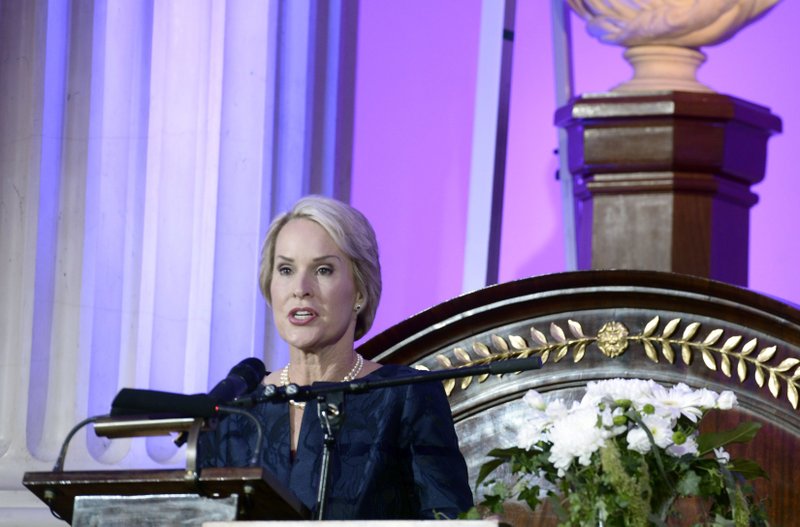STOCKHOLM -- Three researchers who "harnessed the power of evolution" to produce enzymes and antibodies that have led to a best-selling drug and biofuels won the Nobel Prize in chemistry on Wednesday. One expert called their discoveries "revolutionary."
Frances Arnold of the California Institute of Technology was awarded half of the 9-million-kronor ($1.01 million) prize, while the other half was shared by George Smith of the University of Missouri and Gregory Winter of the MRC molecular biology lab in Cambridge, England.
The Royal Swedish Academy of Sciences, which chose the winners, said Arnold, 62, conducted the first directed evolution of enzymes, whose uses include "more environmentally friendly manufacturing of chemical substances such as pharmaceuticals and the production of renewable fuels."
Arnold was only the fifth woman to win a chemistry Nobel since the prizes began in 1901.
Smith, 77, developed a method to evolve new proteins and Winter, 67, used the method to evolve antibodies, which are disease-fighting proteins in the blood.
The first pharmaceutical based on Winter's work was approved for use in 2002 and is employed to treat rheumatoid arthritis, psoriasis and inflammatory bowel diseases, the academy said. The chemical name of the drug is adalimumab, which has several trade names including Humira, one of the top-selling drugs in the world.
The Swedish academy said the winners "harnessed the power of evolution," meaning they made evolution of proteins happen in their labs.
By introducing genetic mutations, they created wide varieties of the proteins, and then selected for those that worked best for the tasks they wanted to achieve. This was a much faster version of the process that drives the evolution of organisms in the natural world.
Proteins designed by Arnold "do these really off-the-wall things in record time," said Matt Hartings, an associate chemistry professor at American University. "Her work is incredible."
Hartings said Arnold's recent development of an enzyme that can promote chemical reactions involving silicon was also a startling accomplishment, "completely bonkers."
Smith credited others for the work that led to his breakthrough.
"Very few research breakthroughs are novel. Virtually all of them build on what went on before. It's happenstance. That was certainly the case with my work," he told The Associated Press.
Smith said he learned of the prize in a pre-dawn phone call from Stockholm.
"It's a standard joke that someone with a Swedish accent calls and says 'You won!' But there was so much static on the line, I knew it wasn't any of my friends," he said.
Winter also ran into phone problems, compounded by what he said was brain-fuzz from a feast at Trinity College Cambridge the night before.
"This operator had a Swedish accent," he told a news conference. "It reminded me of my bank ringing up and telling me I had some dodgy transaction on my account ... I was feeling a bit rocky."
Dr. Wayne Marasco of the Dana-Farber Cancer Institute in Boston said the lab technique developed by Smith and Winter was "revolutionary ... and it's used today, every day."
Marasco said he uses it daily in his own research on developing therapies that use antibodies, which are disease-fighting proteins in the blood.
American Chemical Society president Peter Dorhout praised the Nobel winners, saying "the laureates have used chemistry to accelerate the evolution of natural biological molecules that act as the critical machinery for living organisms.
"The breakthroughs from these researchers enable that to occur thousands of times faster than nature to improve medicines, fuels and other products," he said.
Winter said an encounter with a cancer patient made him realize the importance of his work.
Early in his career he visited a woman who was receiving his then-experimental antibody treatment. Even though Winter didn't know whether the treatment would work, the patient was grateful for whatever extra time it would allow her to spend with her husband.
Winter says he realized afterward there was a "moral imperative" to ensure "what was produced could be used for public benefit."
Experts said the winners' discoveries had an ecological benefit.
"If you can harness enzymes for your own purposes, this is often more environmentally friendly than using heavy metals or toxic substances to make your chemicals," said Johan Aqvist, a member of the Nobel Committee for Chemistry.
In other Nobel prizes this year, the medicine prize went Monday to James Allison of the University of Texas M.D. Anderson Cancer Center and Tasuku Honjo of Kyoto University, who learned how to release the brakes that cancer can put on the immune system, helping doctors fight many advanced-stage cancer tumors and save an "untold" numbers of lives.
Scientists from the United States, Canada and France shared the physics prize Tuesday for revolutionizing the use of lasers in research.
Arthur Ashkin became the oldest Nobel Prize laureate at 96, while Donna Strickland of the University of Waterloo in Canada became only the third woman to win a physics Nobel. Strickland had worked with the third winner, Frenchman Gerard Mourou of the Ecole Polytechnique and the University of Michigan.
The winner of the Nobel Peace Prize is to be announced Friday and the Nobel Memorial Prize in Economic Sciences will be revealed on Monday.
No Nobel literature prize will be awarded this year due to a sex abuse scandal at the Swedish Academy, which choses the winner. The academy plans to announce both the 2018 and the 2019 winner next year -- although the head of the Nobel Foundation has said the body must fix its tarnished reputation first.
The man at the center of the Swedish Academy scandal, Jean-Claude Arnault, a major cultural figure in Sweden, was sentenced Monday to two years in prison for rape.
Heintz reported from Moscow. Malcolm Ritter and Chris Chester in New York and Danica Kirka in London contributed to this story.
NW News on 10/04/2018

